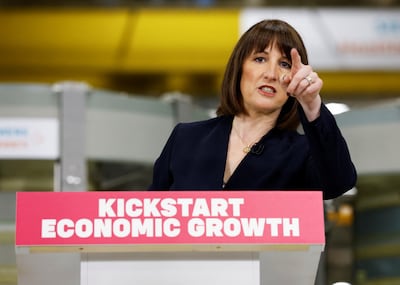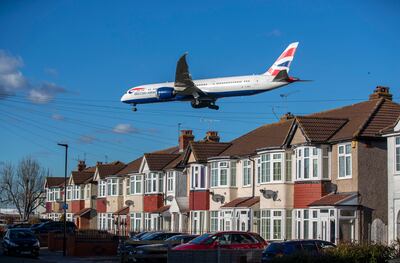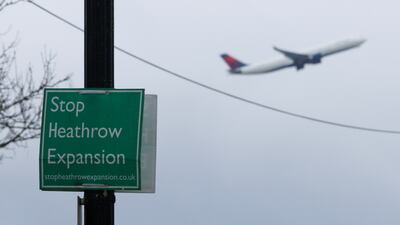It is hard not to emit a yawn when hearing about the plans for a third runway at Heathrow Airport.
To say we have been here before is an understatement. Yet Rachel Reeves and her colleagues are madly excited about the project, as if it represents dramatic progress and is an economic lifesaver. Already, the eco arguments are rearing up. The number of flights across west London will increase hugely and with them, the accompanying noise and emissions. The Chancellor assures us that aviation has moved on since airport expansion was last on the agenda and that new planes are being developed that are much more environmentally friendly.
Over which there must be doubt. What Ms Reeves says takes no account of how quickly these planes will come on stream and whether airlines will view them as economically viable; if indeed, they will buy them and in sufficient volume as to achieve a genuine difference. Rather overlooked so far have been the more localised issues surrounding the disruption to road traffic on the affected M25 and the rerouting of rivers that criss-cross the area. Unlike other major international airports, Heathrow directly abuts London’s orbital motorway, the busiest in the UK. The motorway was not there, not even as an idea when the airport's first terminal was first built, but it is now and that presents a huge obstacle.
The UK must make a cultural shift and begin enabling not obstructing
Put all that and more together, and it is difficult to imagine a new runway being operational in the next 15 years, let alone a decade or sooner as Ms Reeves envisions. The government is promising to bulldoze planning laws to accelerate construction but the legal system remains. Whatever is mooted will leave space for challenge and review.
What this highlights yet again is the sheer impossibility of getting anything done in the UK. Ours is an overcrowded island, one that is covered in hills and valleys, none more so than in the south-east. Boris Johnson recognised this, which is why he proposed building a new airport in the Thames Estuary. The popular press, as is its wont, immediately dubbed the notion “Boris Island” and the whole thing became the object of ridicule and TV panel jokes.
For Heathrow see HS2, nuclear power stations, a bridge between Scotland and Northern Ireland (another Johnson proposal), a second Channel Tunnel. These are just the flagships. Lesser schemes, ones that are more vital, such as new NHS hospitals and state schools, are equally hindered by delays, disputes, inquiries and reviews.
Money is an issue but there are ways of structuring funding, so the private sector can participate and achieve a return. It is about something extra and currently insurmountable.
We should face facts and accept it is no one’s fault. We want Britain’s infrastructure to improve, to keep pace with the times, to reflect a nation that is modern, offering the very latest facilities, boosting the lives of its people and visitors, making it appealing to investors, rivalling overseas competitors.
Short-termism
For that, we must move away from the short-termism of our politics, in which everything suggested is instantly countered. The UK head of state is above, but outside, the political arena and is not involved in decision-making. In other places, it is often the president or king or queen who is closely identified with a landmark addition. They make it their own, they can knock heads together and get it over the line. That cannot, and does not, occur in the UK.
Instead, there is a sea of officialdom, reporting to ministers who change frequently – Labour has been in power eight months and already we are on to our second transport secretary. The clock is ticking towards the next general election, when everything might change again. That is allowing, too, for Prime Minister Keir Starmer surviving until then. He could depart and his successor may have an alternative view. Look at what took place under the Tories. They had a rapid-fire movement of premiers and each one brought another perspective and their own priorities. There was Johnson, talking up his "grands projets", only to have them quashed by his successors Liz Truss and Rishi Sunak.
Mr Starmer is sitting on a substantial majority but that does not mean he is unassailable, either before or at the polls. In four years, Heathrow could slip down the list and where will we be? Probably, airport capacity would only then reappear at some later date. On we go, which is the UK pattern to date.
There is a case for a body that is removed from the hurly-burly, the in and out, and is dedicated to developing national transport and public facilities. It should have weight and authority, and as much as possible remain independent of Westminster. That sounds great but is not so attainable in a democracy that conducts itself to daily fire and fury. It feels, too, like a recipe for yet more central expense and bureaucracy, just when we want less not more.
It is true that Elon Musk, for one, might condemn such an organisation, but something must give. You only need to examine what has been constructed or is under construction in Britain recently, and currently, to realise how sclerotic we have become. All there is at present in terms of large-scale works is a truncated fast-rail link between London and Birmingham. Mr Johnson said 20 new hospitals would be added. Clearly, they would have filled a void but they have been scrapped. Energy plants take an age, and Britain’s fuel requirements and security continue to worsen. There is only one motorway across the Pennines. This week, the closure of another, albeit lesser, road, Snake Pass, was recommended because it is vulnerable to landfall. There is no motorway along the eastern side, connecting London with Newcastle and Edinburgh, and points in between. Likewise, entire regions are served by outdated, poor rail and road links. In west London, Hammersmith Bridge has been closed to vehicles for almost six years with no date for its reopening. Children must endure classes in crumbling buildings. Asbestos is an abiding problem.
Ever extending, the roll-call of shame goes on. On as well, does the lack of replacement and improvement. The UK must make a cultural shift and begin enabling not obstructing. It requires coupling with a system, a formalised structure, that is designed to be "can do" as opposed to "cannot".
Pharaoh's curse
British aristocrat Lord Carnarvon, who funded the expedition to find the Tutankhamun tomb, died in a Cairo hotel four months after the crypt was opened.
He had been in poor health for many years after a car crash, and a mosquito bite made worse by a shaving cut led to blood poisoning and pneumonia.
Reports at the time said Lord Carnarvon suffered from “pain as the inflammation affected the nasal passages and eyes”.
Decades later, scientists contended he had died of aspergillosis after inhaling spores of the fungus aspergillus in the tomb, which can lie dormant for months. The fact several others who entered were also found dead withiin a short time led to the myth of the curse.
TV (UAE time);
OSN Sports: from 10am
Our family matters legal consultant
Name: Hassan Mohsen Elhais
Position: legal consultant with Al Rowaad Advocates and Legal Consultants.
MATCH INFO
Hoffenheim v Liverpool
Uefa Champions League play-off, first leg
Location: Rhein-Neckar-Arena, Sinsheim
Kick-off: Tuesday, 10.45pm (UAE)
Women & Power: A Manifesto
Mary Beard
Profile Books and London Review of Books
About RuPay
A homegrown card payment scheme launched by the National Payments Corporation of India and backed by the Reserve Bank of India, the country’s central bank
RuPay process payments between banks and merchants for purchases made with credit or debit cards
It has grown rapidly in India and competes with global payment network firms like MasterCard and Visa.
In India, it can be used at ATMs, for online payments and variations of the card can be used to pay for bus, metro charges, road toll payments
The name blends two words rupee and payment
Some advantages of the network include lower processing fees and transaction costs
Key facilities
- Olympic-size swimming pool with a split bulkhead for multi-use configurations, including water polo and 50m/25m training lanes
- Premier League-standard football pitch
- 400m Olympic running track
- NBA-spec basketball court with auditorium
- 600-seat auditorium
- Spaces for historical and cultural exploration
- An elevated football field that doubles as a helipad
- Specialist robotics and science laboratories
- AR and VR-enabled learning centres
- Disruption Lab and Research Centre for developing entrepreneurial skills
Company%20profile%20
%3Cp%3E%3Cstrong%3EName%3A%20%3C%2Fstrong%3EElggo%3Cbr%3E%3Cstrong%3EStarted%3A%3C%2Fstrong%3E%20August%202022%3Cbr%3E%3Cstrong%3EFounders%3A%3C%2Fstrong%3E%20Luma%20Makari%20and%20Mirna%20Mneimneh%3Cbr%3E%3Cstrong%3EBased%3A%3C%2Fstrong%3E%20Dubai%2C%20UAE%3Cbr%3E%3Cstrong%3ESector%3A%3C%2Fstrong%3E%20Education%20technology%20%2F%20health%20technology%3Cbr%3E%3Cstrong%3ESize%3A%3C%2Fstrong%3E%20Four%20employees%3Cbr%3E%3Cstrong%3EInvestment%20stage%3A%3C%2Fstrong%3E%20Pre-seed%3C%2Fp%3E%0A
Red flags
- Promises of high, fixed or 'guaranteed' returns.
- Unregulated structured products or complex investments often used to bypass traditional safeguards.
- Lack of clear information, vague language, no access to audited financials.
- Overseas companies targeting investors in other jurisdictions - this can make legal recovery difficult.
- Hard-selling tactics - creating urgency, offering 'exclusive' deals.
Courtesy: Carol Glynn, founder of Conscious Finance Coaching
The%20specs
%3Cp%3E%3Cstrong%3EEngine%3A%3C%2Fstrong%3E%20Dual%20synchronous%20electric%20motors%0D%3Cbr%3E%3Cstrong%3EPower%3A%20%3C%2Fstrong%3E660hp%0D%3Cbr%3E%3Cstrong%3ETorque%3A%20%3C%2Fstrong%3E1%2C100Nm%0D%3Cbr%3E%3Cstrong%3ETransmission%3A%20%3C%2Fstrong%3ESingle-speed%20automatic%0D%3Cbr%3E%3Cstrong%3ETouring%20range%3A%20%3C%2Fstrong%3E488km-560km%0D%3Cbr%3E%3Cstrong%3EPrice%3A%20%3C%2Fstrong%3EFrom%20Dh850%2C000%20(estimate)%0D%3Cbr%3E%3Cstrong%3EOn%20sale%3A%20%3C%2Fstrong%3EOctober%3C%2Fp%3E%0A
Sarfira
Director: Sudha Kongara Prasad
Starring: Akshay Kumar, Radhika Madan, Paresh Rawal
Rating: 2/5
MATCH INFO
Uefa Champions League semi-final, first leg
Bayern Munich v Real Madrid
When: April 25, 10.45pm kick-off (UAE)
Where: Allianz Arena, Munich
Live: BeIN Sports HD
Second leg: May 1, Santiago Bernabeu, Madrid
What drives subscription retailing?
Once the domain of newspaper home deliveries, subscription model retailing has combined with e-commerce to permeate myriad products and services.
The concept has grown tremendously around the world and is forecast to thrive further, according to UnivDatos Market Insights’ report on recent and predicted trends in the sector.
The global subscription e-commerce market was valued at $13.2 billion (Dh48.5bn) in 2018. It is forecast to touch $478.2bn in 2025, and include the entertainment, fitness, food, cosmetics, baby care and fashion sectors.
The report says subscription-based services currently constitute “a small trend within e-commerce”. The US hosts almost 70 per cent of recurring plan firms, including leaders Dollar Shave Club, Hello Fresh and Netflix. Walmart and Sephora are among longer established retailers entering the space.
UnivDatos cites younger and affluent urbanites as prime subscription targets, with women currently the largest share of end-users.
That’s expected to remain unchanged until 2025, when women will represent a $246.6bn market share, owing to increasing numbers of start-ups targeting women.
Personal care and beauty occupy the largest chunk of the worldwide subscription e-commerce market, with changing lifestyles, work schedules, customisation and convenience among the chief future drivers.
PROFILE OF INVYGO
Started: 2018
Founders: Eslam Hussein and Pulkit Ganjoo
Based: Dubai
Sector: Transport
Size: 9 employees
Investment: $1,275,000
Investors: Class 5 Global, Equitrust, Gulf Islamic Investments, Kairos K50 and William Zeqiri
The specs
- Engine: 3.9-litre twin-turbo V8
- Power: 640hp
- Torque: 760nm
- On sale: 2026
- Price: Not announced yet
BMW M5 specs
Engine: 4.4-litre twin-turbo V-8 petrol enging with additional electric motor
Power: 727hp
Torque: 1,000Nm
Transmission: 8-speed auto
Fuel consumption: 10.6L/100km
On sale: Now
Price: From Dh650,000
Specs
Engine: Dual-motor all-wheel-drive electric
Range: Up to 610km
Power: 905hp
Torque: 985Nm
Price: From Dh439,000
Available: Now
Why are asylum seekers being housed in hotels?
The number of asylum applications in the UK has reached a new record high, driven by those illegally entering the country in small boats crossing the English Channel.
A total of 111,084 people applied for asylum in the UK in the year to June 2025, the highest number for any 12-month period since current records began in 2001.
Asylum seekers and their families can be housed in temporary accommodation while their claim is assessed.
The Home Office provides the accommodation, meaning asylum seekers cannot choose where they live.
When there is not enough housing, the Home Office can move people to hotels or large sites like former military bases.
Sunday's Super Four matches
Dubai, 3.30pm
India v Pakistan
Abu Dhabi, 3.30pm
Bangladesh v Afghanistan
TCL INFO
Teams:
Punjabi Legends Owners: Inzamam-ul-Haq and Intizar-ul-Haq; Key player: Misbah-ul-Haq
Pakhtoons Owners: Habib Khan and Tajuddin Khan; Key player: Shahid Afridi
Maratha Arabians Owners: Sohail Khan, Ali Tumbi, Parvez Khan; Key player: Virender Sehwag
Bangla Tigers Owners: Shirajuddin Alam, Yasin Choudhary, Neelesh Bhatnager, Anis and Rizwan Sajan; Key player: TBC
Colombo Lions Owners: Sri Lanka Cricket; Key player: TBC
Kerala Kings Owners: Hussain Adam Ali and Shafi Ul Mulk; Key player: Eoin Morgan
Venue Sharjah Cricket Stadium
Format 10 overs per side, matches last for 90 minutes
Timeline October 25: Around 120 players to be entered into a draft, to be held in Dubai; December 21: Matches start; December 24: Finals
MATCH INFO
Jersey 147 (20 overs)
UAE 112 (19.2 overs)
Jersey win by 35 runs
AI traffic lights to ease congestion at seven points to Sheikh Zayed bin Sultan Street
The seven points are:
Shakhbout bin Sultan Street
Dhafeer Street
Hadbat Al Ghubainah Street (outbound)
Salama bint Butti Street
Al Dhafra Street
Rabdan Street
Umm Yifina Street exit (inbound)
The specs
Engine: 4.0-litre V8 twin-turbocharged and three electric motors
Power: Combined output 920hp
Torque: 730Nm at 4,000-7,000rpm
Transmission: 8-speed dual-clutch automatic
Fuel consumption: 11.2L/100km
On sale: Now, deliveries expected later in 2025
Price: expected to start at Dh1,432,000
England-South Africa Test series
1st Test England win by 211 runs at Lord's, London
2nd Test South Africa win by 340 runs at Trent Bridge, Nottingham
3rd Test July 27-31 at The Oval, London
4th Test August 4-8 at Old Trafford, Manchester
Bookshops: A Reader's History by Jorge Carrión (translated from the Spanish by Peter Bush),
Biblioasis
The%20Killer
%3Cp%3E%3Cstrong%3EDirector%3A%C2%A0%3C%2Fstrong%3EDavid%20Fincher%3C%2Fp%3E%0A%3Cp%3E%3Cstrong%3EStars%3A%C2%A0%3C%2Fstrong%3EMichael%20Fassbender%2C%20Tilda%20Swinton%2C%20Charles%20Parnell%3C%2Fp%3E%0A%3Cp%3E%3Cstrong%3ERating%3A%3C%2Fstrong%3E%204%2F5%C2%A0%3C%2Fp%3E%0A
Rebel%20Moon%20%E2%80%93%20Part%20Two%3A%20The%20Scargiver%20review%20
%3Cp%3E%3Cstrong%3EDirector%3A%3C%2Fstrong%3E%20Zack%20Snyder%3Cbr%3E%3Cstrong%3EStarring%3A%3C%2Fstrong%3E%20Sofia%20Boutella%2C%20Charlie%20Hunnam%2C%20Ed%20Skrein%2C%20Sir%20Anthony%20Hopkins%3Cbr%3E%3Cstrong%3ERating%3A%3C%2Fstrong%3E%202%2F5%3Cbr%3E%3Cbr%3E%3C%2Fp%3E%0A
TOUCH RULES
Touch is derived from rugby league. Teams consist of up to 14 players with a maximum of six on the field at any time.
Teams can make as many substitutions as they want during the 40 minute matches.
Similar to rugby league, the attacking team has six attempts - or touches - before possession changes over.
A touch is any contact between the player with the ball and a defender, and must be with minimum force.
After a touch the player performs a “roll-ball” - similar to the play-the-ball in league - stepping over or rolling the ball between the feet.
At the roll-ball, the defenders have to retreat a minimum of five metres.
A touchdown is scored when an attacking player places the ball on or over the score-line.
More Iraq election coverage:
Killing of Qassem Suleimani
The years Ramadan fell in May
What can you do?
Document everything immediately; including dates, times, locations and witnesses
Seek professional advice from a legal expert
You can report an incident to HR or an immediate supervisor
You can use the Ministry of Human Resources and Emiratisation’s dedicated hotline
In criminal cases, you can contact the police for additional support
Why seagrass matters
- Carbon sink: Seagrass sequesters carbon up to 35X faster than tropical rainforests
- Marine nursery: Crucial habitat for juvenile fish, crustations, and invertebrates
- Biodiversity: Support species like sea turtles, dugongs, and seabirds
- Coastal protection: Reduce erosion and improve water quality
Killing of Qassem Suleimani
JAPAN SQUAD
Goalkeepers: Masaaki Higashiguchi, Shuichi Gonda, Daniel Schmidt
Defenders: Yuto Nagatomo, Tomoaki Makino, Maya Yoshida, Sho Sasaki, Hiroki Sakai, Sei Muroya, Genta Miura, Takehiro Tomiyasu
Midfielders: Toshihiro Aoyama, Genki Haraguchi, Gaku Shibasaki, Wataru Endo, Junya Ito, Shoya Nakajima, Takumi Minamino, Hidemasa Morita, Ritsu Doan
Forwards: Yuya Osako, Takuma Asano, Koya Kitagawa
Tuesday's fixtures
Kyrgyzstan v Qatar, 5.45pm




